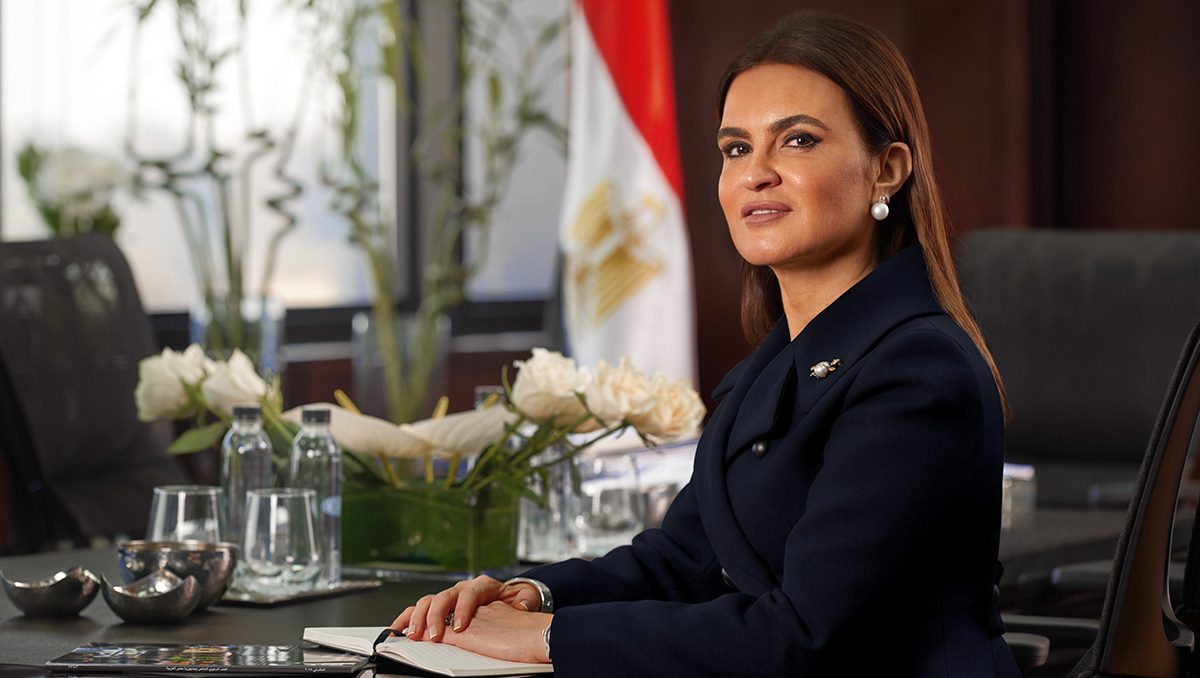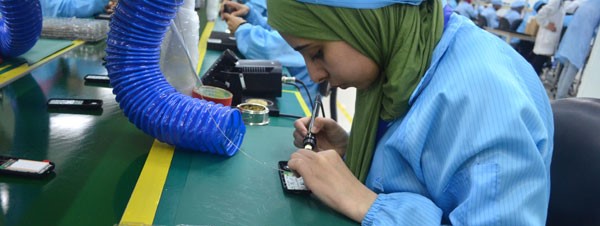Perhaps two of the most commonly mentioned terms in the news nowadays are investment and reform. Both words have been used to present a myriad of economic coverage at opposite ends of the spectrum, from new optimistic plans to strong concerns.
One particular side of the Egyptian government, the Ministry of Investment and International Cooperation, has witnessed a remarkable increase in media presence lately, largely fueled by bold promises.

To get a better understanding of the overall trajectory of the country’s investment portfolio and its economic development, Business Monthly sat with the Minister of Investment and International Cooperation Sahar Nasr, for an in-depth discussion of the immediate impact of the ministry’s recent projects, related challenges, and the investment climate.
What can you tell our readers about the new investment map? How do you see it evolving?
We wanted to promote a level playing field; we thus ensured that everybody has equal access and equal opportunity to benefit from the existing investment projects.
I label it the “Egyptian Investment Map” as it presents a compilation of a lot of work done by all ministries. For example, we have investment opportunities prepared by the ministries of agriculture, antiquities, health, education, trade and industry, petroleum, and electricity.
The map is broken down by governorate, sector, and size of the respective project. It includes all the mega projects as well, such as the New Administrative Capital, the 1.5 million-feddan agriculture reclamation project, the Suez Canal Economic Zone, to name a few.
We have ensured that this map and the ministry’s Investor Service Center (ISC) are tailored to address the different needs of investors. For example, investors who operate conglomerates tend to have an interest in a diversified set of sectors, we, therefore, provide them with details on various legal frameworks and opportunities that suit them.
Another example is the nature of the information that multinationals require. They are always interested in finding out more about the presence of healthcare services, hospitals, schools, universities, accessibility to the closest ports, and different roads in the respective areas where they intend to operate. They want to make sure they are provided with all the different services their business and employees may need. They need to ensure that they are getting an integrated package.
This is a really comprehensive map for investment in Egypt.
What has been the initial feedback?
We are getting a lot of positive feedback. The ISC has witnessed a long list of visitors interested in finding out more about the different opportunities and incentives offered, especially since each entry on the map includes tax and non-tax incentives that the investor can benefit from.
We also have people accessing the map online and their questions are catered to through email.
The ministry is clearly moving towards more of a “one-stop-shop” orientation. Other than easing the investment process, how do investors benefit from this shift?
One of the main achievements in the new investment law is article 21 that stipulates the establishment of the ISC, which can be labeled as “the one-stop-shop”.
Our focus when developing the ISC was to make it much easier to do business in Egypt. We have an automated system with electronic queuing, e-signature, and you can establish your company in a few hours, maximum a day. You can do all of this online.
The center has representatives from 66 ministries and government bodies who are authorized to sign off on documents. A few examples include the tax authority, the credit registry, the stock exchange, the financial supervisory authority, three banks, and the ministry of interior. Moreover, the center offers legal advice with a focus on startups.
Any entity the investor needs to deal with to establish a company or to issue a license is available at the center.
The ministry has offered a myriad of investment facilitations. How does this play in terms of ensuring inclusive growth?
We have addressed inclusive growth through the new investment law. It is the first-ever law that clearly states equal opportunity by gender. In addition, the law clearly specifies that all companies receive equal access to information, to the market, and to land. In simple words, it ensures a level playing field.
Furthermore, in order to ensure that all governorates benefit from the enhanced investment climate, we offer tax and non-tax incentives to investors who are interested to operate in areas that are lagging behind, such as Upper Egypt and Sinai.
For example, new investors in Upper Egypt can enjoy a tax exemption up to 50 percent, based on the investment cost.
Similarly, small and medium enterprises (SMEs) can receive a tax exemption up to 30 percent of their investment cost.
What we mean by “inclusive” is to ensure that everybody, each governorate, each company, and each individual in society, will reap the benefit of economic growth. We simply need to make sure that no opportunities are exclusive to a certain group.
Speaking of SMEs, in your opinion, how do the recent legal reforms come into play to ensure a more encouraging, safer climate for them?
We provide a comprehensive package of support for SMEs, not just in terms of the legal framework but in terms of technical support as well.
Other than the incentives provided through the investment law, we have established Fekretak Sherkitak (Your Idea, Your Company), a startup accelerator that provides young firms with financial support in equity financing.
This model is for small-scale investors who are worried about the credit risk and prefer to expand their shareholder base rather than accumulate debt. Furthermore, the accelerator equips entrepreneurs with the necessary tools and resources needed to grow their business.
What about the new bankruptcy law, how does it impact SMEs?
The key to a good business environment is easy entry, easy exit. It is very important for the market and for consumers alike that a company can safely exit. We have allowed for this to happen.
Furthermore, we have ensured that struggling companies will not be referred to civil court but rather deal with an economic court that is knowledgeable enough to distinguish a wrong business decision or the misreading of a situation from mismanagement and improper business operations.
The new investment law permits the free flow of investment, profits, and salaries of expats into and out of the country. How does this impact the investment appeal of Egypt and what specific challenges does it resolve?
I believe it is important to highlight here that the new investment law has been developed after extensive consultations and brainstorming sessions with local and foreign companies from the private sector, as well as with representatives from all chambers of commerce. We have listened to all their concerns and examined the hurdles they face. Furthermore, we met at length with several ministries to ensure that we are in tune with the different sets of challenges that stem from working in different locations.
Two key issues, for foreign investors in particular, are their ability to gain access to foreign currency and to transfer their profits outside of Egypt. We want to provide them with sufficient guarantees that these previous limitations no longer exist, in order to encourage them to invest and expand their businesses in Egypt.
What are the challenges faced with developing projects such as the Suez Canal Economic Zone?
The Suez Canal Economic Zone has been one of the most strategic and attractive locations in Egypt. I get asked about it in most of my trips aboard promoting investments. What is especially attractive is that the zone lies on the path of the “One Road One Belt” initiative that links Europe, Asia, and Africa.
I believe what boosted the zone’s potential, even more, is that we have allowed it to benefit from the investment law’s incentives. Furthermore, last year we solved many issues and challenges affecting the area.
Another aspect we are focused on is promptly addressing any issues that may arise. Part of creating a conducive business environment is making sure that problems are quickly resolved. Time matters to investors.
The Golden Triangle project promises to lure investment to a forgotten yet rich area. As investors tend to shy away from newer climates, as well as some challenges in the area, how will the government ensure it attracts sufficient investors to Upper Egypt?
There already exists a great deal of interest to invest in the project. The Golden Triangle is located in one of the regions that enjoy a variety of incentives, as per the recent investment law, additionally, the area is endowed with a lot of natural resources.
It was once true that investors erred on the side of caution, but the overall situation is changing quite rapidly. Previous concerns were mainly fueled by the lack of infrastructure. However now, with the new highways, roads, ports, and the much-improved access to electricity, it is an entirely different story.
It is a source of pride to see Benban solar park become the largest in the world when just a few years ago the area was suffering from a lack of electricity. Furthermore, the region witnessed an expansion in its natural gas grid, electricity grid, healthcare services, and education. This is why we are seeing many large investors, such as Samsung and Al Ghurair Group, bring their capital to Upper Egypt.
In terms of FDI trends, how do western investors behave differently than GCC investors? Which sectors appeal more to different countries and why?
Investors from the Gulf Cooperation Council (GCC) tend to focus more on real estate and construction sectors, with some attention directed towards agribusiness. Investors from the United States, however, tend to favor the oil and gas sector. Similarly, investment influx from the United Kingdom is geared towards the hydrocarbon industry as well as a clear interest in clean energy. This is in addition to the fast-moving consumer goods market that is mainly geared by western investment.
Currently, Egypt is repositioning itself as a global investment destination. The country not only presents a huge market that caters to a population in excess of 100 million, but a large part of this population is young and skilled. Secondly, we have several free trade agreements and a strategic location. Thirdly, the devaluation of the local currency has made it cheaper to invest and do business, as the cost of both labor and energy has sharply declined. Adding to the mix the recent legal reforms and the undergoing infrastructure development. All these factors present investors with an attractive business climate.
I expect the influx in investments to continue over the coming period.
What are the efforts to boost investments from Asia?
We have a very strategic relation with the continent, especially with China, given Egypt’s location along the “One Road One Belt” initiative. Moreover, we have excellent partnerships with Japan, with whom we are collaborating on the Egyptian Grand Museum project, as well as on several large-scale educational projects.
As for Korea, we have a lot of activity in our energy and transportation sectors. This is especially important at this stage, as Egypt is expanding in its construction of new cities and the infrastructure that links them to the existing urban landscape.
In your opinion, what are the yet-to-be addressed concerns of larger investors in Egypt, and how is the ministry planning to address these challenges in the future?
We need to continue automating our systems. We need to continue improving the government’s structure. We need to continue cutting more red tape, streamlining procedures, and slashing bureaucracy even further. I believe we need to invest more in our young people and in our civil servants. These reforms are critical as they will help us maximize the benefit from all the new laws that are being introduced.
Creating labor-intensive projects is a priority to help address issues that face our growing population. We thus need to encourage more investments that feed in this direction and we need to promote the industrial sector and increase its output.
One thing I need to highlight is that improving investors’ access to financing is a priority for us. We are working with the European Bank for Reconstruction and Development, International Finance Corporation, and others to secure both long-term finance and foreign currency. This is important for the ease of doing business in Egypt. Furthermore, we are working with the World Bank and the International Monetary Fund to make Egypt an attractive destination.
If you were to give a first-time investor one piece of advice, what would it be?
Simple: Invest in Egypt.







